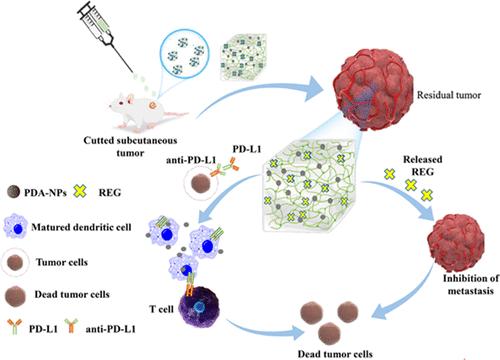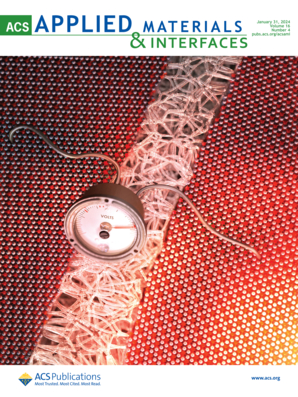可注射的聚多巴胺纳米粒子水凝胶用于抗血管生成和刺激杀瘤免疫以抑制转移和切除后复发
IF 8.3
2区 材料科学
Q1 MATERIALS SCIENCE, MULTIDISCIPLINARY
引用次数: 0
摘要
手术切除仍是乳腺癌临床治疗的主要手段,但术后免疫抑制微环境和残留肿瘤的新血管生成容易导致肿瘤转移和复发,进一步危及患者生命。抗血管生成治疗与免疫治疗相结合,可促进免疫重编程和血管正常化的相互促进循环,避免肿瘤转移和复发。在此,我们制备了聚多巴胺纳米颗粒,用于改善组织粘附性和富集肿瘤相关抗原。将这种纳米调节剂与瑞戈非尼(REG)进一步结合到由2,2,6,6-四甲基哌啶-1-氧自由基氧化甲壳素和氧化透明质酸接枝而成的水凝胶中。该系统可长期释放 REG。与抗 PD-L1 结合使用后,应用于手术伤口的水凝胶可减少肿瘤转移和复发。这种效果是通过抑制血管生成和增强抗肿瘤免疫力实现的,其特征是肿瘤、脾脏和引流淋巴结内效应 T 淋巴细胞水平的提高和树突状细胞的活化。这种可注射水凝胶为防止肿瘤转移和复发的术后管理提供了一种前景广阔的策略。本文章由计算机程序翻译,如有差异,请以英文原文为准。

Injectable Polydopamine Nanoparticle-Incorporated Hydrogels for Antiangiogenesis and Stimulating Tumoricidal Immunity to Inhibit Metastasis and Recurrence Postresection
Surgical resection is still the main means for clinical treatments of breast cancer, but the postoperative immunosuppressive microenvironment and neoangiogenesis of the residual tumors easily lead to tumor metastasis and recurrence, which will further endanger patients’ lives. The combination of antiangiogenic therapy and immunotherapy may promote the mutually reinforced cycle of immune reprogramming and vascular normalization to avoid tumor metastasis and recurrence. Herein, we prepared polydopamine nanoparticles for improving tissue adhesion and enriching tumor-associated antigens. This nanoregulator together with regorafenib (REG) was further incorporated into a hydrogel developed from grafting adipic acid dihydrazide onto 2,2,6,6-tetramethylpiperidine-1-oxyl radical oxidized chitin and oxidized hyaluronic acid, which was injectable at the cavity after subcutaneous tumor surgery with good mechanical properties and degradability. The system showed long-term release of REG. After combining with anti-PD-L1, the hydrogel applied to the surgical wound exhibited a reduction in tumor metastasis and recurrence. This effect was achieved by suppressing angiogenesis and enhancing antitumor immunity, characterized by increased levels of effector T lymphocytes and activation of dendritic cells within tumors, spleens, and draining lymph nodes. The injectable hydrogel offers a promising strategy for postoperative management aimed at preventing tumor metastasis and recurrence.
求助全文
通过发布文献求助,成功后即可免费获取论文全文。
去求助
来源期刊

ACS Applied Materials & Interfaces
工程技术-材料科学:综合
CiteScore
16.00
自引率
6.30%
发文量
4978
审稿时长
1.8 months
期刊介绍:
ACS Applied Materials & Interfaces is a leading interdisciplinary journal that brings together chemists, engineers, physicists, and biologists to explore the development and utilization of newly-discovered materials and interfacial processes for specific applications. Our journal has experienced remarkable growth since its establishment in 2009, both in terms of the number of articles published and the impact of the research showcased. We are proud to foster a truly global community, with the majority of published articles originating from outside the United States, reflecting the rapid growth of applied research worldwide.
 求助内容:
求助内容: 应助结果提醒方式:
应助结果提醒方式:


